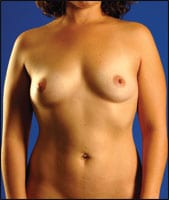The Plastic Surgery Foundation (PSF) received approval from the U.S. FDA for its Investigational Device Exemption (IDE) application and will now proceed as sponsor of a prospective, multicenter observational trial studying the impact of acellular dermal matrix (ADM) and surgical mesh in implant-based breast reconstruction.
“These devices should be rigorously evaluated in relation to surgical technique, device loss, complications, and aesthetic and patient-reported satisfaction outcomes,” says The PSF President Bernard Lee, MD, MPH, MBA, who is a co-principal investigator (co-PI) of the study. “The PSF has assumed an important leadership role by undertaking this study.”
“An approved protocol is an essential first step to executing a clinical trial capable of providing manufacturers with the level of high-quality scientific evidence needed to submit a Premarket Approval Application (PMA) to the FDA,” adds Gayle Gordillo, MD, who is also a co-PI of the study. “This action can further gauge the safety and effectiveness for patient use.”
Surgical mesh devices—whether synthetic, animal, or human collagen-derived—have not yet received FDA approval for any breast reconstruction indication. However, ADMs and surgical meshes can be marketed and promoted for other approved uses, such as soft-tissue reinforcement. Currently, surgeons, hospitals, and other facilities may elect to use these devices in breast reconstruction or other breast surgery via “off-label” use.
The PSF is currently working with Lee, Gordillo, and Scot Glasberg, MD, executive sponsor of the IDE, to finalize execution details for the study and enable site recruitment. Due diligence and funding discussions are underway with many manufacturers regarding participation. The PSF anticipates its first patient enrollments in early 2023.
“This is strictly an observational study,” says Glasberg. “Since these devices have been used in this manner for approximately 17 years and have become the standard of care, The PSF will not ask surgeons to randomize their patients or change their usual practice of medicine in terms of the procedures or devices they use.”
“Limiting surgeons to participation in a single study or control arm will eliminate bias associated with investigators deciding in which arm to place each patient—for example, placing patients with a greater risk profile in the subpectoral or device study groups,” Glasberg adds. “We are grateful that the FDA has recognized this approach as necessary to adequately fill all study arms. The PSF’s partnership with FDA on this study will hopefully finally yield approval for these important devices in breast reconstruction surgery.”
The PSF invites manufacturers interested in partnering in this study to submit a supplemental IDE package to request FDA approval to participate. The PSF will recruit sites to fill the two non-ADM/mesh control arms, which will be used as the comparator for all the device study arms.



